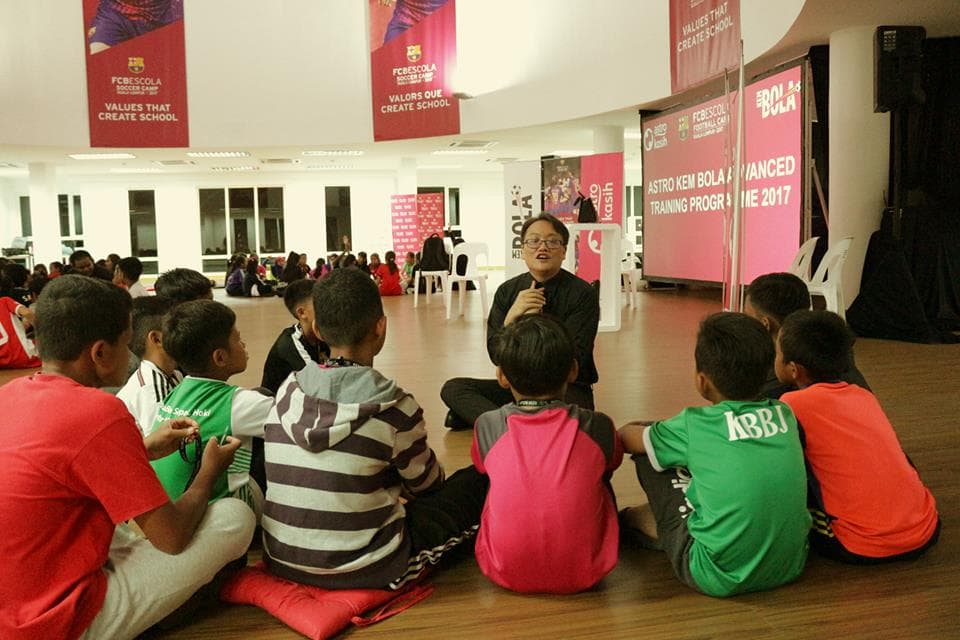I’ve always loved drama, even as a child. I was the weird kid who would read the conversations in comics and storybooks aloud.
I loved playing around with different voices. Sometimes, my mother was convinced there were other people in the house when I was having a reading session.
I would also round up a few playmates in the neighbourhood and together we would go on superhero escapades. Yours truly would be the impromptu director and writer, all-in-one.
I would buy Disney soundtrack tapes and sing along to their songs. I especially loved the songs by the villain, shaking my bum to The Little Mermaid’s “Poor Unfortunate Souls” and slinking down the hallway to “Be Prepared” from The Lion King.
These seemingly trivial activities may not be seen as productive as studying hard and scoring well in exams, but I picked many important skills and characteristics which helped me later in life. In fact, it’s helped me in the corporate world as well as a budding theatre professional.

project spect-ator [photo credit: paul gan]
1. Improved presentation skills and clear articulation
One of the best ways to leave an impression with prospective employers is by how well you speak and carry yourself. Having these helped get corporate jobs in marketing and customer service.
My superiors liked me because they could always rely on my presentation skills to push an idea forward or to leave a professional impression with the customers I encountered.
I developed these skills as a child. I remember joining my father as he developed his public speaking skills through a series of self-help tapes called “Speech Power”.
Reading and listening to those tapes with him taught me to speak with clarity. This eventually helped me with the storytelling and speech activities in school.
Even if you aren’t a performer, it’s still an important skill. Remember, in whatever capacity you’re hired for, you’ll be working with others. You’ll need to communicate your ideas in a clear and engaging manner. This is especially important in Malaysia where soft skills are sorely lacking.
2. Creative thinking
Whether you’re play-acting as a child, or leading a low budget production, you won’t have a lot of resources available to you. Sometimes, you just have to make do with what you have. However, by observing what you have around you, and applying a little ingenuity, the possibilities open up.
One of the best examples of resourcefulness comes from the kids I teach drama to. I gave my class an assignment of preparing, rehearsing and presenting an Aesop’s fable in 10 minutes.
One group decided to tell the story of how a fox was too smart for his own good, and could not escape the hunting dogs in time because she was too busy thinking about how to escape them. As the fox was attacked (all harmless playacting, of course), one 11-year-old girl actually threw red Lego in the air to represent blood spatter. It was hilariously clever!
This resourcefulness is important especially in Malaysia, where a lot of productions do not have the luxury of a big budget. That has not stopped many local theatre practitioners from finding ways to tell their story, using simple black room and everyday props.

hosting forum theatre [photo credit: victor chen]
3. Empathy
To be an effective theatre performer, there is one essential skill you need for a convincing performance: the ability to emphatise. This works in two ways.
The first, is the ability to consider how a character you’re playing feels in different situations. When you’re able to put yourself in your character’s shoes, you can react naturally to the story. This gives a much more convincing performance.
The second is to be sensitive to the feelings your fellow performer is giving you. You’ll need to react to that, and work with it to create an impressive performance for the audience.
Personally, it’s difficult for me to take on roles of angry, aggressive people, since I have a non-confrontational personality. But if I have to, giving a good performance takes more than just tensing my muscles, slamming the table, and shouting at the top of my lungs. I have to go deeper and understand the thought process of the character. What motivates him? Fear? Desperation? A sense of urgency?
Being able to empathise has helped me understand people who are different from me. It encouraged me to connect to others, and understand what makes them tick. People are actually fascinating – the more different they are, the more enriching the conversation!
4. Teamwork and leadership skills
This brings me to another important skill that really helped shape my life: how to work with a team, and learning how to lead.
I’ve worked with a variety of teams varying from church productions to this mature comedy series called ‘Syiok Sendiri’. Each team has a different culture and flavour of people. In each instance, you’re required to build chemistry with your fellow performer for a quality performance.
The love of drama eventually led me to a part-time career in teaching children. If you want to develop leadership skills, try tackling a class full of active pre-schoolers along with a few special needs kids added to the mix.
Let me tell you – it’s frightening. There were days I dreaded going to class because it sometimes took me the entire class period just to try and keep control of the class, let alone teach them anything.
But as with dealing with any team, you take time to understand them and learn what makes them tick. I learned that every child needs an adult to connect with, and believe in them. With constant reinforced structure, the kids learn what to expect, and work accordingly.
I’ll admit it’s still a work in progress but I’m making headway in leading them to a successful production.
5. Inspiring others with meaningful stories
The one thing that I loved most about any performance I watched on screen or stage was how it moved and inspired me.
I had the amazing privilege of being part of an improv group called Project Spect-Actor that toured schools and universities to use drama as a tool to discuss bullying. We would engage the audience by re-enacting a scenario, and then give the audience a chance to intervene by replacing one of our characters.
By bringing this immersive experience to them, we managed to create an impact in the community. Some got to experience bullying first-hand, and understand the victim. Others came to see how bullies were made.
Discussion of the different scenarios and their proposed solutions raised tough questions which made people realise that there are many layers to an incident.
But the greatest experience was with ourselves. We had a director who was passionate not just about discussing the issue, but with bringing wholeness in some respect. He made it a point in preparing us for the scenarios and roles by giving us a safe space to open up about our own experiences with bullying and oppression. We found a family of friends and a sense of healing in that vulnerable space. By building that within us, it showed in our interaction with our audience as well.
Many people may consider drama to be a frivolous subject matter. But if you ever get to see the work that goes behind a production, you realise that to be a performer, you must pick up on a lot of skills that aren’t just practical on stage but in any environment you are in.
Even if it isn’t an academic subject, you can be sure that every child or even adult can benefit from its practical value.
More from Real Mental Health
“I Was Scared of Waking Up in Handcuffs,” shares Depressed M’sian on Repealed Law
In 2023, Malaysia repealed Section 309, a colonial-era law that made suicide attempts a crime. The change marked a shift …
‘Everyone Saw A Successful Student While I Was Crumbling,’ Shares 22 Year Old Student
This is a story of a 22 year old woman who shared her story as a Straight A’s student as …
5 Harmful Mental Health Myths Malaysians Still Believe
Let’s break down five of the most common myths Malaysians still believe, and why it’s time to let them go.














